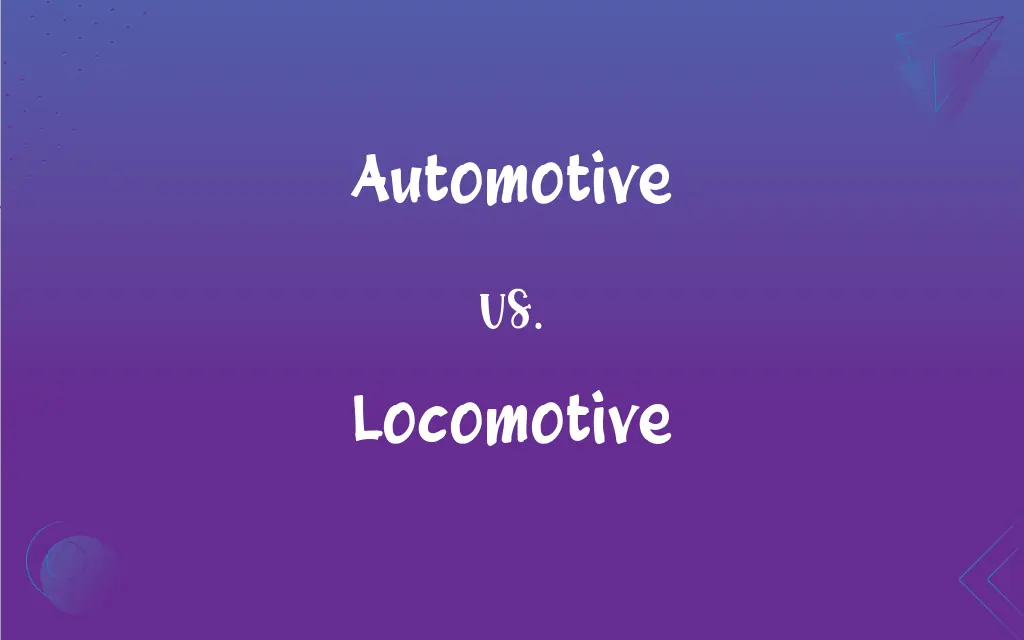Automotive vs. Locomotive: What's the Difference?
Edited by Harlon Moss || By Janet White || Published on January 21, 2024
Automotive refers to vehicles powered by an engine or motor, primarily for road use; locomotive denotes a rail vehicle designed to pull trains.

Key Differences
Automotive pertains to vehicles like cars, trucks, and motorcycles, designed for road transportation. Locomotive refers specifically to a rail vehicle that provides the motive power for a train, pulling carriages or freight wagons on tracks.
Vehicles in the automotive category are built for a variety of purposes, from personal transport to commercial use, featuring diverse designs and sizes. Locomotives, however, are engineered specifically for rail transport, focusing on power and durability to haul significant weight over long distances.
Automotive vehicles can be powered by gasoline, diesel, electric motors, or hybrids. Locomotives are traditionally powered by diesel or electricity, and some newer models incorporate hybrid technologies for improved efficiency.
Automotive vehicles operate on roads and highways, requiring extensive road infrastructure. Locomotives run on railway tracks, which involves a different kind of infrastructure, often more efficient for heavy and bulk transport over longer distances.
The automotive industry sees a wide range of technological advancements, from autonomous driving to electric vehicle technology. The locomotive sector focuses on increasing efficiency, power, and capacity, with advancements in rail technology and train management systems.
ADVERTISEMENT
Comparison Chart
Usage
Road transport (cars, trucks, bikes).
Rail transport (pulling trains).
Design Purpose
Personal and commercial transport.
Hauling trains over railways.
Power Source
Gasoline, diesel, electric, hybrids.
Diesel, electric, hybrids (for some).
Infrastructure
Roads, highways.
Railway tracks.
Technological Focus
Efficiency, safety, comfort, autonomy.
Power, efficiency, capacity.
ADVERTISEMENT
Automotive and Locomotive Definitions
Automotive
Personal Transport.
The automotive industry has revolutionized personal mobility.
Locomotive
Train Engine.
The locomotive pulled a line of freight cars.
Automotive
Containing within itself the means of propulsion or movement;
A self-propelled vehicle
Locomotive
Rail Power.
Diesel locomotives are common on many railways.
Automotive
Technological Advancement.
Advancements in automotive technology improve fuel efficiency.
Locomotive
Transportation Workhorse.
The locomotive is the workhorse of the rail industry.
Automotive
Transportation Sector.
The automotive sector is a crucial part of the global economy.
Locomotive
Railway Vehicle.
The old steam locomotive is now a museum piece.
Automotive
Vehicle Manufacturing.
Major cities have seen growth in automotive manufacturing.
Locomotive
Efficient Hauling.
Locomotives are essential for efficient cargo transport.
Automotive
Engine-Powered Vehicles.
Automotive vehicles like cars and motorcycles dominate road transport.
Locomotive
A self-propelled vehicle, usually electric, diesel, or steam-powered, for pulling or pushing freight or passenger cars on railroad tracks.
Automotive
Moving by itself; self-propelling or self-propelled.
Locomotive
A driving or pulling force; an impetus
"The US could no longer serve as the locomotive for the world economy" (George Soros).
Automotive
Of or relating to self-propelled vehicles.
Automotive
Having the ability to move by itself; self-propelled or self-propelling.
Automotive
Of, or relating to motor vehicles.
Automotive
A shop or company that sells motor vehicle parts
Automotive
Of or pertaining to the automobile.
Automotive
Containing within itself the means of propulsion or movement.
Automotive
Of or relating to motor vehicles;
Automotive supplies
FAQs
Can "automotive" refer to electric vehicles?
Yes, electric vehicles are included under the automotive category.
What does "automotive" mean?
Automotive refers to anything related to the design, development, manufacture, and selling of motor vehicles.
Is the term "automotive" only related to cars?
Primarily, but it also encompasses motorcycles, trucks, and other motor vehicles.
What is the automotive industry?
It's an industry focused on the production and sale of motor vehicles.
What's an example of an automotive innovation?
The development of self-driving car technology is a prime example.
Is automotive engineering the same as mechanical engineering?
Not exactly. Automotive engineering is a specialized branch of mechanical engineering focusing specifically on vehicle design and production.
Are all trains considered locomotives?
No, only the vehicles providing the motive power are locomotives.
Are automotive parts the same as car parts?
Yes, automotive parts are essentially car parts and components.
Is the term "automotive" used globally?
Yes, it's a standard term used worldwide to refer to motor vehicles and their industry.
Are bicycles considered automotive?
No, bicycles aren't motorized and hence aren't classified as automotive.
What fuels can locomotives use?
Locomotives can be steam, diesel, or electrically powered.
What's the difference between a locomotive and a train?
A train is the entire set of cars plus the locomotive, while a locomotive is just the vehicle providing the power.
Is the term "locomotive" specific to any region?
No, it's a universally recognized term in the railway industry.
What does an automotive designer do?
They design the appearance and functionality of vehicles, including style, ergonomics, and aerodynamics.
How do steam locomotives work?
They use steam generated from boiling water to drive pistons, creating motion.
Are locomotives still used today?
Yes, especially for freight transportation and in some passenger services.
What does "locomotive" mean?
A locomotive is a powered rail vehicle used for pulling trains.
Can locomotives be automated?
Technological advancements are leading to more automated systems in locomotives.
Can a locomotive carry passengers?
Typically, it's designed to pull cars, not carry passengers.
What is a diesel-electric locomotive?
It's a locomotive that uses a diesel engine to generate electricity, which then powers electric motors.
About Author
Written by
Janet WhiteJanet White has been an esteemed writer and blogger for Difference Wiki. Holding a Master's degree in Science and Medical Journalism from the prestigious Boston University, she has consistently demonstrated her expertise and passion for her field. When she's not immersed in her work, Janet relishes her time exercising, delving into a good book, and cherishing moments with friends and family.
Edited by
Harlon MossHarlon is a seasoned quality moderator and accomplished content writer for Difference Wiki. An alumnus of the prestigious University of California, he earned his degree in Computer Science. Leveraging his academic background, Harlon brings a meticulous and informed perspective to his work, ensuring content accuracy and excellence.







































































